Menopause revisited: The HRT edition
hormone replacement therapy -- the pros, cons and costs
Hello everyone,
Let’s hit the food and cooking pause button to discuss menopause and women’s health, a topic that many of you weighed in on earlier. I’ve been meaning to catch up with you about it.
Last week, before my routine mammogram, the technician asked if I was on hormones. I was caught off guard for a moment. It had been five years since I stopped taking birth control pills and five years since I started getting regular mammogram screenings.
My usual response had been: “No hormones or prescription drugs. I only take multivitamins and some supplements.” I was hormonally liberated!
Well, that’s changed. My 2024 response to the technician was: “Yes, I’m on hormone replacement therapy. For menopause. HRT.”
Last March, many of you shared your peri- and post-menopause experiences in the “Pausing for Menopause” dispatch. This life stage confuses and confounds.
After weighing the risks and my situation, I was on the fence about going on hormone replacement therapy (HRT). I’ve been alright at rejiggering my eating habits to be more plant-forward and have been exercising regularly too. Tofu is among my healthy BFFs (best food friends). All of that has helped.
I didn’t have severe sleeplessness, frequent hot flashes, or drenching night sweats. One of my friends reported having about 40 hot flashes per day! Compared to other women, my menopause experience was a cake walk. When my primary care doctor asked to describe my symptoms, I defaulted to, “They’re mild.”
“If things get worse, tell me,” she said.
What exactly is ‘worse’? I had no clue. Menopause is different for each woman. However, Google “menopause symptoms” and you basically get the same generic list. There’s little nuance to help women determine their particular situation. Doctors are listening for certain trigger words to prescribe appropriate relief.
I didn’t know how to talk about what I was going through. Plus I feared sounding like a wimp. None of my sisters went on HRT. My mom said in Vietnam, women didn’t have menopause because it’s just life. “Menopause is a western thing.”
To gauge the severity of my menopause symptoms and to come up with ways to describe how I felt, I started talking to other women — friends, neighbors, strangers. My husband, Rory, participated in menopause conversations too. He’s heavily invested in my well being. (A happy wife is a happy life.)
Why menopause talk matters
Menopausal women used be dismissed as being ‘hysterical’, witches, and crones. The whole thing is terribly misunderstood. Nowadays, more women are openly speaking about their menopause journeys and there has been some progress.
In March 2024, President Biden signed a women’s healthcare executive order that included creating the first-ever National Institutes of Health series on menopause and menopausal symptom treatment. Halle Berry, 58, recently advocated for better women’s health research.
The shift is partly generational. Gen X women like me, born between 1965 and 1980, will not be going through this quietly. There are a lot of us.
According to the Mayo Clinic, there will globally be about 1.2 billion women in menopause and post-menopause by 2030. From now until then, approximately 47 million women will enter that phase of life each year.
Of the women in menopause, about 85 percent report menopausal symptoms, according to the National Institutes of Health.
Economically, menopausal women suffering symptoms can significantly cost businesses in terms of productivity. Given that women’s health has long been overlooked, a focus on menopause is great for future generations.
But my peers and I am going through menopause now. What to do?
I want to share with you why I went on HRT and what it’s been like. You may relate and or have lots to share as well.
Air-fryer face
In 2023, after I entered post-menopause, I assumed things would be better. But I suddenly had occurrences of my face flushing bright red and looking like I had stuck my head into an air-fryer.
Usually, my menopause symptoms subsided after a week or two. However, the air-fryer face episodes lasted for a good month. Sometimes Rory looked at me and said, “Your skin looks really weird now.” My mom, a vain woman who’s hyper observant about how her family looks, suggested I see a doctor about my skin.
Sometimes you need others to tell you that there’s something you need to do. I was trying to tough it out. After all, my mom said that menopause didn’t exist in Asia, that women just sucked it up and went on with life.
My close friends and I were texting about Hormone Replacement Therapy (HRT). The gals at the hair salon talked about it. I read about it in the New York Times in this extensive overview and this straightforward FAQ (gift links expire in 30 days).
Was it for me?
My doctor is a solid home cook. So when I described my air-fryer face situation, her eyes nearly bugged out in the tele-doc screen on my iPhone. Then we both laughed to break the tension. Her assessment went like this:
Given all your symptoms, you’re on the border for needing hormone replacement therapy. But why don’t you try it and see how it works for you. You’re in a good post-menopausal window to start it now. It’s low risk for you, given your health and phase in life. When you eventually stop taking it, maybe five years or so, your hormones will have matured too.
I asked her to clarify the matured hormones. It meant that I’ll be older and so will my hormones so they’ll hopefully be calmer, she explained. We also discussed another issue that’s common with menopausal women: dealing with vaginal atrophy, for which there’s a cream and syringe dispenser involved.
So I gave it all a whirl.
Patch, pill, and cream
Starting in May 2024, I added these to my health care routine:
an estrogen patch + progesterone pill = the HRT combo
estrogen cream
Because the stuff may seem weird, here’s what they look like :

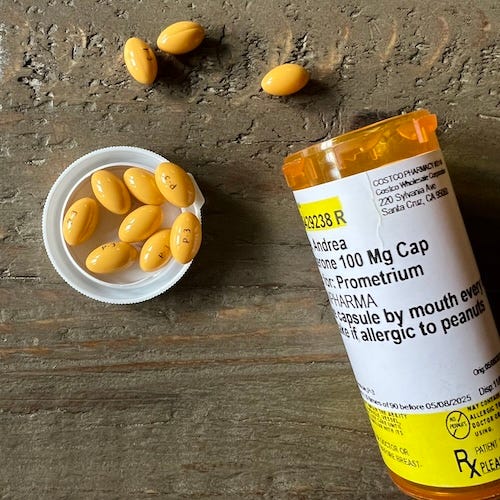
How life changing is HRT?
I didn’t wake up feeling 30 years old again! HRT works subtly. But my symptoms slowly faded away. Rory commented that I was er . . . more pleasant. Maybe I was feeling like relief was arriving?
During the first three months, little seemed to be happening. But by month five, I noticed that I was feeling a lot better — less aggravated, no more air-fryer face episodes that lingered for hours, and fewer oddball aches and pains.
By month six, my skin felt nicer, thanks in part to HRT and to some new skin care products. So, it seems that HRT has — to some extent — helped me.
I’ll stick with it for now. As for the vaginal estrogen, it’s made a positive impact too!
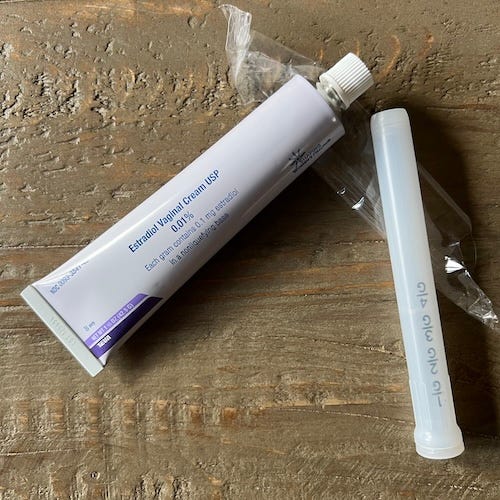
How much does all this cost?
We fortunately have good healthcare insurance. I remember my birth control pills being fully covered from the get go. However, unbeknownst to me, the first three months of the HRT patch and progesterone pill wasn’t covered by insurance. I paid roughly $100 for each monthly refill of the two items. I was initially stunned by the cost (who can afford this stuff for years???). The pharmacy technician who rang me up said that the cost may change after three months, depending on my insurance coverage.
They were correct. After what turned out to be a 3-month trial period, the generic version of the HRT combo became fully covered by my health insurance. Had I not been able to afford to stick with it for the full three months (and even longer), I wouldn’t have thought it was worth it.
To add to the confusion, vaginal atrophy affects many menopausal women yet vaginal estrogen cream is not covered whatsoever and can cost a pretty penny. Walgreens quoted me $70. A local indie pharmacy quoted me around $80. Costco’s pharmacy service quoted me about $35 so guess who got my business?
Aha! Menopause has made me wiser.
I’m lucky to have health coverage, a patient husband, and a caring doctor. Deciding to use HRT was one thing. Trying to understand its affordability was another.
How many women seek menopause relief?
Not as many as you’d think, but maybe that will change. From a survey conducted by The Journal of the Menopause Society:
It has been estimated that 75% of menopausal women do not seek medical advice or treatment for their symptoms, and approximately 50% delay seeking treatment for more than 6 months. . . . Untreated VMS [Vasomotor symptoms, aka menopause-related hot flashes and night sweats] have been associated with poor health-related quality of life (HRQoL), comorbidities, and work productivity losses, as well as increased healthcare resource use and costs. This highlights the importance of effective symptom relief and is corroborated by the results of a survey indicating that more than 50% of women in the United States would prefer living up to 90 days less rather than experiencing VMS at their worst for 30 days.
Sure, the survey may have a certain level of bias but no doubt, that last sentence is quite the kicker.
Some people would interpret the survey findings as business opportunities, but more importantly, the findings illustrate a big gap between symptoms and treatment. Many women feel bad but most don’t do anything about it.
What I learned about managing menopause
I would have done this better had I known that:
I needed to accurately describe my menopause symptoms to my healthcare provider so that they could assess the severity of my situation.
What’s a serious hot flash for some women was air-fryer face flush for me. I didn’t think my face flush was a big deal until I began comparing notes with other women.
I had to have back and forth conversations with my health care providers. It made me closer to my doctor in a way but it took time and effort.
If you’ve considered HRT, what was your decision making process? And if you went on HRT (or had a partner who did), what was it like? Comments are open for everyone!
This is a lot to take in, but we can’t wait for the medical community or government to figure it out for us. We need to share knowledge and experiences with one another. From the ground up, women and men can make a difference.





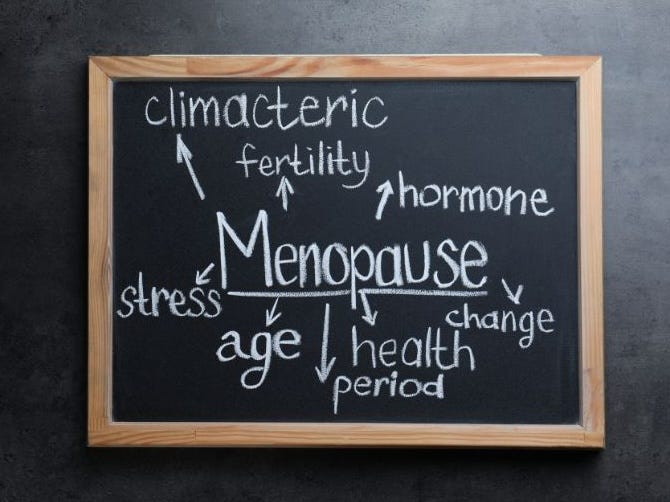

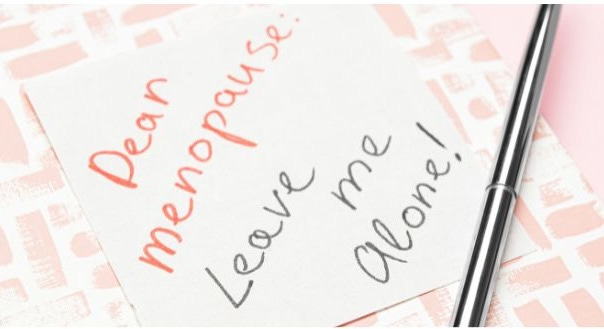
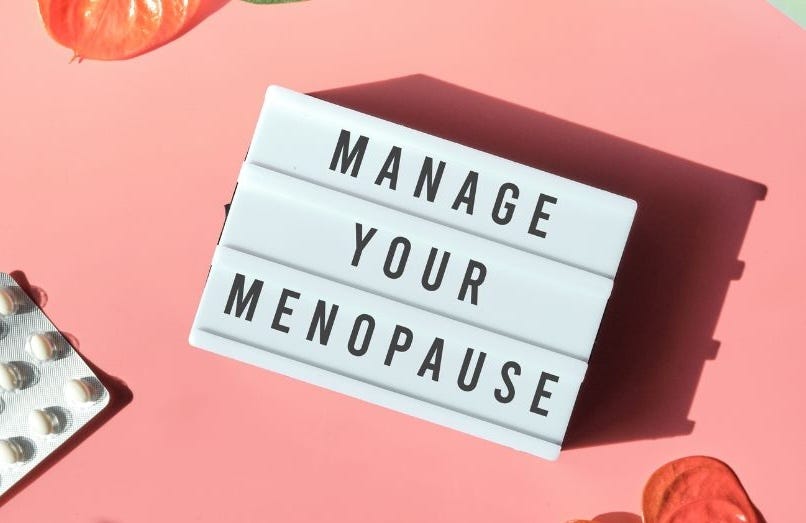
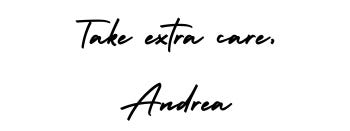
Thanks for this, Andrea. Unusual though it sounds, it's a very important topic and suddenly a lot of women are talking about it. (See my friend Valerie Monroe at https://valeriemonroe.substack.com.) For so long we women, half the human race, have been kept in the dark about our "shameful" conditions, menstruation, menopause, and others. It is liberating to be open and frank about a universal female experience. I have nothing to add since my own experience was a long time ago, but I salute you for opening the discussion.
It took me quite a long time to get any HRT help at all, because I'm in a rural area, and docs were still scared off by that 1990s breast cancer study. My biggest concerns were mental health. I was getting SO mean, and short tempered, and having a really hard time with light and sound sensitivity. I have a few neurodivergent traits (as does my entire family) and I did find a study pointing out that this seems to be how menopause presents in that cohort. Same as you, a little Dotti/progesterone, four months in I'm not thrilled to be reminded I have a uterus, but the mental health relief has been enormous.